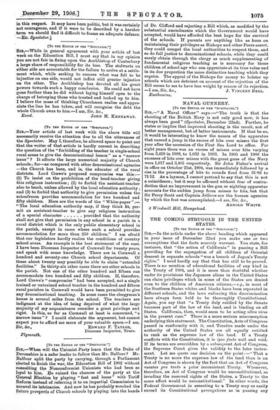THE COMING STRUGGLE IN THE UNITED STATES.
pro THE EDITOR OW THE "SPECTATOR,"] SIR,—In the article under the above heading which appeared in your issue of December 22nd you make one or two assumptions that the facts scarcely warrant. You state, for instance, that "the action of California" in passing a Bill providing for the segregation of all children of Oriental descent in separate schools "was a breach of Japan's Treaty rights." I need hardly say that that has still to be proved. There is no mention of educational facilities of any kind in the Treaty of 1894, and it is more than doubtful whether under its provisions the Japanese aliens in the United States can claim privileges which in some of the States are denied even to the children of American citizens,—e.g., in most of the Southern States whites and blacks have been separated in different schools, and the laws enforcing this discrimination have always been held to be thoroughly Constitutional. Again, you say that "a Treaty duly ratified by the Senate becomes part of the law of the land, and is binding on all States. California, then, would seem to be acting ultra sires in the present case." There is a more serious misconception underlying this statement. The Constitution, Acts of Congress passed in conformity with it, and Treaties made under the authority of the United States are all equally entitled to rank as the supreme law of the land. If a Treaty conflicts with the Constitution, it is ipso facto null and void. If its terms are overridden by a subsequent Act of Congress, the Supreme Court gives the validity to the later instru- ment. Let me quote one decision on the point :—" That a Treaty is no more the supreme law of the land than is an Act of Congress is shown by the fact that an Act of Congress vacates pro tanto a prior inconsistent Treaty. Whenever, therefore, an Act of Congress would be unconstitutional, as invading the reserved rights of the States, a Treaty to the same effect would be unconstitutional." In other words, the Federal Government in assenting to a Treaty may as easily exceed its Constitutional prerogatives as in passing any ordinary measure of legislation. It cannot do by Treaty what it is forbidden to do by the law of the Constitution. These principles, and especially the application of them, make very considerable inroads on your statement that a duly ratified Treaty becomes part of the law of the land and is binding on all States. The Japanese claim that the Treaty of 1894 gives them the right not merely to be educated in the public schools of America, but to be educated side by side with the Americans themselves. I have already said I think it doubtful whether- the terms of that Treaty can be made to bear any such construction. But assuming that that is their true interpretation, I have no hesitation in saying that they are at painful variance with the Constitution. Otherwise, we are forced to believe that the Federal Govern- ment is legally competent to regulate the minutest detail of the educational system in.each State,—a supposition that a very slight knowledge of the American Constitution will show to be altogether untenable. There are thus at least three legal questions involved in the dispute between the, United States and Japan. Was California acting within her Con- stitutional rights in ordering the separate education of Orientals ? Did her action conflict with the Treaty of 1894? Assuming that it did, is the Treaty of 1894 Con- stitutional, or did the Federal Government exceed its powers in concluding it? And behind all these there lies, as you point out, the practical question of how a Treaty, even if it is in absolute accordance with the Constitution, is to be enforced against a State that chooses to violate its provisions.



































 Previous page
Previous page